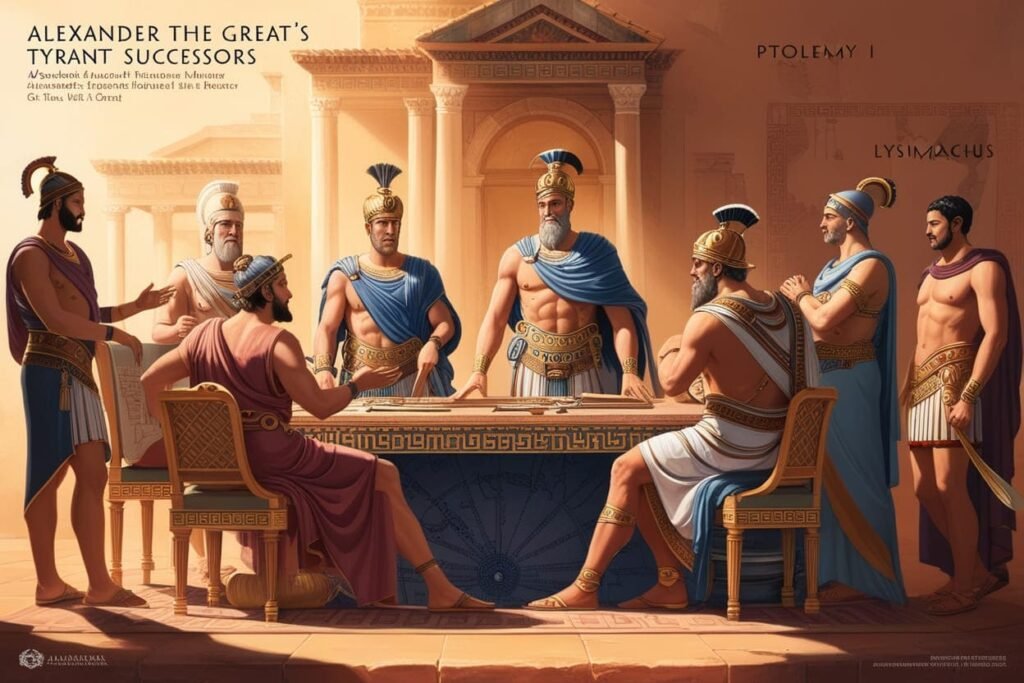Tyrant :
The Death of Cleitus :
by now,many of the Macedonian troops were unhappy with Alexander the tyrant. Most had not seen their homes in years,but their kings seemed bent on Conquest Without End. What was worse, He’d begun to adopt the rituals and dress of their defeated Persian enemy-Customs they viewed as a feminate, And decadent. As maracanda modern Samarkand, after a furious, drunken argument, Alexander killed coleitus the black. Coleitus had been one of Alexander’s best generals. And the man who saved his life at the Battle of the granicus. Alexander was full of remorse, but his growing arrogance was alienating more and more old comrades. When he tried to make his countrymen perform the traditional Persian ritual of proskinesis- prostrating themselves before the king-he crossed a line. To Greeks this was blasphemy-Only a God was worthy of such respect-and Alexander was forced to back down.
The Conspiracy and the Marriage :
in bactria. Another plot to assassinate Alexander was uncovered. This time the ringleader was a royal page-one of the sons of Macedonian nobility who attended the king. Hermolaus had become murderously bitter towards Alexander over a perceived Injustice. He and his accomplices were tortured, and then Stone to death. Callisthenes, Alexander’s official historian, was also implicated in the conspiracy. He was thrown in prison, where he later died. That summer, in 327- according to Legend-Alexander became captivated by the beauty of Roxana, daughter of a Bactrian lord. Their marriage was also a sound political move, Helping to end local revolt against his rule-and allowing him to continue his advance…. Into modern Pakistan, and India.
To the edge of the world :
Alexander now prepared to subdue the Persian Empire’s most eastern provinces, which had yet to recognize his kingship. To do so he would first have to cross the Hindu Kush mountains and reach the Indus River Valley. Advancing in two columns, his army won a series of skirmishes against the Aspassi and Assaceni. As they fought their way into what’s now the SWAT Valley of Northern Pakistan. After a fierce Siege, Alexander took the Assacenian capital of massaga. According to Legend it was ruled by a beautiful queen, cleophis, Who Bore Alexander a son, and was allowed to keep her throne.
The Battle of the Hydaspes: A Pyrrhic Victory for Alexande:
the ruler of taxilla, near modern Islamabad, had formed an alliance with Alexander. Together they marched to face porus, king of pauravas, at the Battle of the hydaspes. It was Alexander’s costliest battle, as porus’s war elephants inflicted terrible casualties amongst the Greeks. But despite Porus’s Fearless leadership, the battle ended in a decisive victory for Alexander, winning him control of the Punjab.
The Mutiny at the Hyphasis: Alexander’s Eastern Ambitions Checked:
Alexander wanted to push on into India, to reach the Great River which ancient Greek geographers said form the edge of the world. But at the river Hyphasis, known today as the Beas, his Army mutinied. His men at Marched thousands of miles, Fought countless battles, and not seen their homes in 8 years. They’d heard rumors of gigantic armies waiting for them in India. they refused to go any further. Alexander was Furious, but had to turn the Army around. He followed the rivers of the Punjab to the Sea-a journey that took 10 months. On the way, he defeated the mahlians, but while leading the assault on their Capital, was wounded in the chest and nearly killed.
A Journey of Suffering: The Land Route Back to Persia
in reaching the coast, part of the army, under Nearchus, boarded ships, and returned to Persia by sea… sailing through the Straits of Hormuz… and entering the Persian Gulf. It was one of the great ancient Voyages of exploration, As these Waters have been previously unknown to Greeks. Meanwhile Alexander led the rest of the army back by land through the Gedrosian desert, today in southern Pakistan. But extreme heat and shortages of food and water led to terrible suffering, and many deaths among his army.
Building a New Empire: Alexander’s Vision for a United Realm
On his return to Persia, Alexander executed several of his viceroys and governors-men accused of ruling unjustly, and robbing temples and tombs, during his long absence in the east. At Susa, he arranged a magnificent Mass-marriage of Macedonian officers to 80 Persian Noblewomen, to strengthen bonds between his two kingdoms. Alexander himself married to Persian princesses. He also paid all his soldiers debts, and ordered 30,000 youths from across the Empire to be trained in the Macedonian Art of War.
Mutiny at Opis: A Test of Alexander’s Leadership
but at Opis, his Macedonian troops mutinied. they were offended by Alexander’s apparent preference for Persian advisors and Persian ways. As a tyrant, Alexander had the ringleaders executed, and made a speech to the men, reminding them of the glories they’d won together, and leading eventually to an emotional reconciliation. At Ecbatana, Alexander’s closest and most trusted friend, Hephaestion, died of fever. The King was grief stricken, when days without eating, and ordered a period of public morning across the empire.
A World Acknowledges His Reign: Alexander’s Legacy Takes Shape
Alexander waged a successful campaign against the mountain Raiders of cossaea, Who not even the Persian kings had been able to subdue. Returning to Babylon, he was met by embassies from distant peoples, come to recognize his greatness-Aethiopians, libyans, European Scythians, Lucanians, Etruscans, gauls and iberians. Alexander’s Bactrian wife Roxana was now pregnant…. But as he planned his next campaign, to Arabia and Beyond, he developed a sudden fever, and died Days Later, age just 32. The cause of Alexander’s death has never been established. It may have been malaria, cholera, typhus… or poison.
The succesors

A Legacy of Conquest and Division: The Aftermath of Alexander’s Death
Alexander died undefeated in battle. His reputation as a brilliant, fearless and daring military commander remains undimmed. His decade long campaign created one of the largest Empires ever known, stretching from Greece to Pakistan. But it was vast and unstable, held together only by his own Brilliance and name. Alexander left no plans for his succession, and his generals soon began fighting among themselves to carve out their own Empires.
The Lost Tomb of Alexander: A Historical Enigma
In the wars of the successors, for Alexander’s Widow Roxana and his young son were murdered. His own gold sarcophagus, en route to Macedonia for burial was hijacked, and ended up in Alexandria, in Egypt. Today, it’s location remains one of the world’s great Unsolved Mysteries. Few men have ever had such an impact on the course of history as Alexander the Great. The breath-taking achievements of his short life ushered in the Hellenistic age, as Greek ideas spread across the territory of his former Empire, fusing with local Traditions to trigger new developments in art, science, government, and language. Some of the successor kingdoms to his great Empire were short-lived-others endured for centuries…. But all, in turn, would fall to new forces… and in the West, to the rising power of Rome.
Research and artwork for this video comes from Osprey Publishing’s extensive range of books on ancient history. Every Osprey book examines a particular battle, campaign or combat unit in authoritative, meticulous detail. And with more than 3,000 titles, they cover everything from ancient warfare to modern conflict.

